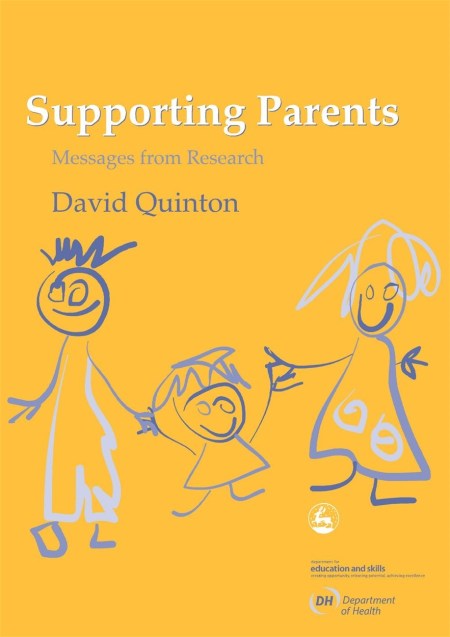`Whose view counts when we decide what “support” to offer or what qualifies as “success”? What kind of support do parents prefer? And can we assume that all parents, by virtue of parents, want the same kind of support? These important questions are discussed in Supporting Parents: Messages from Research. Author David Quinton is professor of psychosocial development at Bristol university’s school for policy studies. His report reviews the results of 14 very different research projects selected in 1994 as part of the then government’s contribution to International Year of the Family. This penetrating overview which explores and analyses the over-arching themes and outcomes concerning the nature and experience of support that is evident from these diverse projects.’
* Zero to Nineteen
* How can agencies mobilize the best support for parents and carers as a vital part of the Children’s National Service Framework?
* What kinds of support do parents and carers themselves say they find most effective?
* What do parents who have difficulties seem to lack in the way of support?
* What exactly do we mean by `support’ and `parenting’?
Supporting Parents brings together authoritative research on supporting parents and carers. Underpinning the government’s developing policy for children’s services, it is essential reading for practitioners, policy makers and academics working in child care.
Professor David Quinton, a nationally recognized authority in the field of parenting and child development, summarizes the key findings of an innovative government-funded series of research studies. The studies explored subjects as diverse as parenting in poverty, disabled parents and children, step-parenting, teenage parents, imprisoned fathers, and parents who reject their children.
Drawing out the key messages for practice and policy, this accessible overview shows how `informal’ support can be complemented by the provision of a fully integrated multi-agency response from health care, education and social services. This important book should be read by all those professionals working with children and their families, including social workers, teachers, GPs and health visitors.
* Zero to Nineteen
* How can agencies mobilize the best support for parents and carers as a vital part of the Children’s National Service Framework?
* What kinds of support do parents and carers themselves say they find most effective?
* What do parents who have difficulties seem to lack in the way of support?
* What exactly do we mean by `support’ and `parenting’?
Supporting Parents brings together authoritative research on supporting parents and carers. Underpinning the government’s developing policy for children’s services, it is essential reading for practitioners, policy makers and academics working in child care.
Professor David Quinton, a nationally recognized authority in the field of parenting and child development, summarizes the key findings of an innovative government-funded series of research studies. The studies explored subjects as diverse as parenting in poverty, disabled parents and children, step-parenting, teenage parents, imprisoned fathers, and parents who reject their children.
Drawing out the key messages for practice and policy, this accessible overview shows how `informal’ support can be complemented by the provision of a fully integrated multi-agency response from health care, education and social services. This important book should be read by all those professionals working with children and their families, including social workers, teachers, GPs and health visitors.
Newsletter Signup
By clicking ‘Sign Up,’ I acknowledge that I have read and agree to Hachette Book Group’s Privacy Policy and Terms of Use
Reviews
The emphasis on helping parents reach their own solutions, reducing inter-professional rivalries, assessing children holistically (and in partnership) and demanding rigorous evaluation echo much that is envisaged for the new children and family services'.
This book provides an overview of the findings of 14 government-funded studies, carried out in the Supporting Parents initiative, between 1996 and 2002. The book presents research findings in non-technical language making them accessible to a wide readership. The strength of the book lies in the author's ability to deal with complexity, in terms of sources of support and content; diversity of family structures; problems faced by parents; and views on services. The only obvious omission, though this is understandable, is a lack of focus on supporting parents who do not engage with social work on a voluntary basis, for instance those who are subject to Parenting Orders. This book will be of great value to social workers and managers. It should be read by those planning new, or refocusing existing services. Most importantly, it should form part of a toolkit for children's services inter-agency planning, service delivery and partnership groups.






